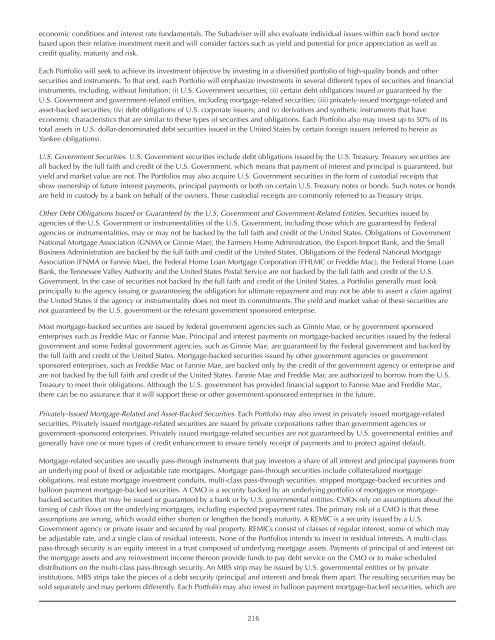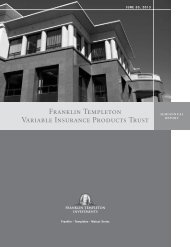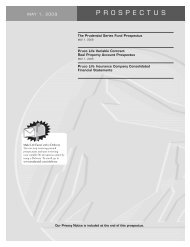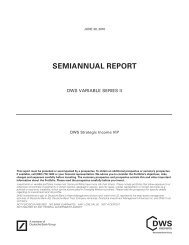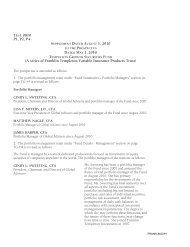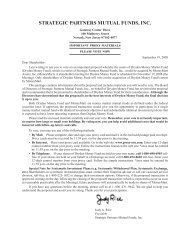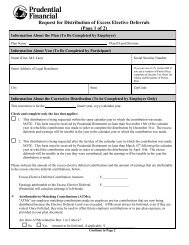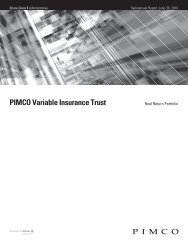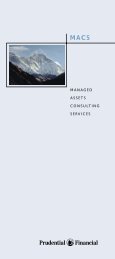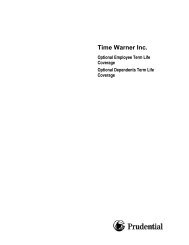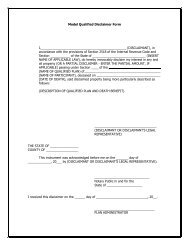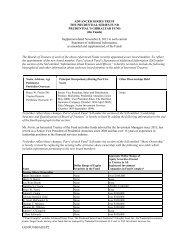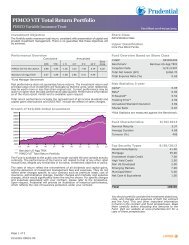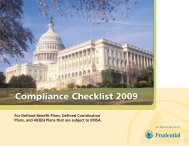Advanced Series Trust AST Academic Strategies Asset ... - Prudential
Advanced Series Trust AST Academic Strategies Asset ... - Prudential
Advanced Series Trust AST Academic Strategies Asset ... - Prudential
Create successful ePaper yourself
Turn your PDF publications into a flip-book with our unique Google optimized e-Paper software.
economic conditions and interest rate fundamentals. The Subadviser will also evaluate individual issues within each bond sector<br />
based upon their relative investment merit and will consider factors such as yield and potential for price appreciation as well as<br />
credit quality, maturity and risk.<br />
Each Portfolio will seek to achieve its investment objective by investing in a diversified portfolio of high-quality bonds and other<br />
securities and instruments. To that end, each Portfolio will emphasize investments in several different types of securities and financial<br />
instruments, including, without limitation: (i) U.S. Government securities; (ii) certain debt obligations issued or guaranteed by the<br />
U.S. Government and government-related entities, including mortgage-related securities; (iii) privately-issued mortgage-related and<br />
asset-backed securities; (iv) debt obligations of U.S. corporate issuers; and (v) derivatives and synthetic instruments that have<br />
economic characteristics that are similar to these types of securities and obligations. Each Portfolio also may invest up to 50% of its<br />
total assets in U.S. dollar-denominated debt securities issued in the United States by certain foreign issuers (referred to herein as<br />
Yankee obligations).<br />
U.S. Government Securities. U.S. Government securities include debt obligations issued by the U.S. Treasury. Treasury securities are<br />
all backed by the full faith and credit of the U.S. Government, which means that payment of interest and principal is guaranteed, but<br />
yield and market value are not. The Portfolios may also acquire U.S. Government securities in the form of custodial receipts that<br />
show ownership of future interest payments, principal payments or both on certain U.S. Treasury notes or bonds. Such notes or bonds<br />
are held in custody by a bank on behalf of the owners. These custodial receipts are commonly referred to as Treasury strips.<br />
Other Debt Obligations Issued or Guaranteed by the U.S. Government and Government-Related Entities. Securities issued by<br />
agencies of the U.S. Government or instrumentalities of the U.S. Government, including those which are guaranteed by Federal<br />
agencies or instrumentalities, may or may not be backed by the full faith and credit of the United States. Obligations of Government<br />
National Mortgage Association (GNMA or Ginnie Mae), the Farmers Home Administration, the Export-Import Bank, and the Small<br />
Business Administration are backed by the full faith and credit of the United States. Obligations of the Federal National Mortgage<br />
Association (FNMA or Fannie Mae), the Federal Home Loan Mortgage Corporation (FHLMC or Freddie Mac), the Federal Home Loan<br />
Bank, the Tennessee Valley Authority and the United States Postal Service are not backed by the full faith and credit of the U.S.<br />
Government. In the case of securities not backed by the full faith and credit of the United States, a Portfolio generally must look<br />
principally to the agency issuing or guaranteeing the obligation for ultimate repayment and may not be able to assert a claim against<br />
the United States if the agency or instrumentality does not meet its commitments. The yield and market value of these securities are<br />
not guaranteed by the U.S. government or the relevant government sponsored enterprise.<br />
Most mortgage-backed securities are issued by federal government agencies such as Ginnie Mae, or by government sponsored<br />
enterprises such as Freddie Mac or Fannie Mae. Principal and interest payments on mortgage-backed securities issued by the federal<br />
government and some Federal government agencies, such as Ginnie Mae, are guaranteed by the Federal government and backed by<br />
the full faith and credit of the United States. Mortgage-backed securities issued by other government agencies or government<br />
sponsored enterprises, such as Freddie Mac or Fannie Mae, are backed only by the credit of the government agency or enterprise and<br />
are not backed by the full faith and credit of the United States. Fannie Mae and Freddie Mac are authorized to borrow from the U.S.<br />
Treasury to meet their obligations. Although the U.S. government has provided financial support to Fannie Mae and Freddie Mac,<br />
there can be no assurance that it will support these or other government-sponsored enterprises in the future.<br />
Privately-Issued Mortgage-Related and <strong>Asset</strong>-Backed Securities. Each Portfolio may also invest in privately issued mortgage-related<br />
securities. Privately issued mortgage-related securities are issued by private corporations rather than government agencies or<br />
government-sponsored enterprises. Privately issued mortgage-related securities are not guaranteed by U.S. governmental entities and<br />
generally have one or more types of credit enhancement to ensure timely receipt of payments and to protect against default.<br />
Mortgage-related securities are usually pass-through instruments that pay investors a share of all interest and principal payments from<br />
an underlying pool of fixed or adjustable rate mortgages. Mortgage pass-through securities include collateralized mortgage<br />
obligations, real estate mortgage investment conduits, multi-class pass-through securities, stripped mortgage-backed securities and<br />
balloon payment mortgage-backed securities. A CMO is a security backed by an underlying portfolio of mortgages or mortgagebacked<br />
securities that may be issued or guaranteed by a bank or by U.S. governmental entities. CMOs rely on assumptions about the<br />
timing of cash flows on the underlying mortgages, including expected prepayment rates. The primary risk of a CMO is that these<br />
assumptions are wrong, which would either shorten or lengthen the bond’s maturity. A REMIC is a security issued by a U.S.<br />
Government agency or private issuer and secured by real property. REMICs consist of classes of regular interest, some of which may<br />
be adjustable rate, and a single class of residual interests. None of the Portfolios intends to invest in residual interests. A multi-class<br />
pass-through security is an equity interest in a trust composed of underlying mortgage assets. Payments of principal of and interest on<br />
the mortgage assets and any reinvestment income thereon provide funds to pay debt service on the CMO or to make scheduled<br />
distributions on the multi-class pass-through security. An MBS strip may be issued by U.S. governmental entities or by private<br />
institutions. MBS strips take the pieces of a debt security (principal and interest) and break them apart. The resulting securities may be<br />
sold separately and may perform differently. Each Portfolio may also invest in balloon payment mortgage-backed securities, which are<br />
216


